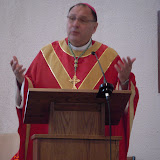Infant Jesus, |
My Dear Brothers and Sisters,
In recent years, words such as “dysfunctional” have been used to describe the changing face and growing fragility of family. Almost every day media brings before us some horrific account of abuse or neglect or worse. Parents abandon children; children mistreat elderly parents. Unwanted newborns are left to die in dumpsters or in bathrooms at high school premises. Poverty creates even more problems, as children go hungry and whole families find themselves homeless. Economic concern have caused the disintegration of family bonds when one parent or both must travel far from home to earn an adequate living.
The Holy Family, whose relationship we honour and celebrate today was not without its own struggles. A betrothed man, Joseph feels jilted; words at the child’s presentation in the temple cause anxiety; a political threat causes the family to seek refuge in a foreign country and hide out in Nazareth after their return; a child runs away in Jerusalem; a son is arrested and executed in his prime. Truly, theirs was a family fraught with all of the ups and downs, joy and sadness of our own families. Yet, as in all good families the manner in which Mary, Joseph and Jesus dealt with the exigencies of their life together made all the difference.
Theirs was a union characterized by reverence for one another which helped them to cope with the difficulties in their lives. Another coping skill, a vital aspect of healthy holy family life, is faith-filled prayer - prayer alone and prayer together. Today’s gospel (Lk 2:41-52) illustrates beautifully that Mary, Joseph and Jesus valued prayer and allowed it to punctuate the various moments of their lives. Because of their piety and their desire to observe the Jewish feasts, the Holy Family would have made prayerful pilgrimage to Jerusalem at least once a year for Passover. Prayerfully, Mary and Joseph presented their son to God in the temple. Prayerfully, Mary pondered in her heart the will of God, to which she and Joseph submitted even without the security of full understanding. May the Holy Family help us pray together and stay together as a family.





